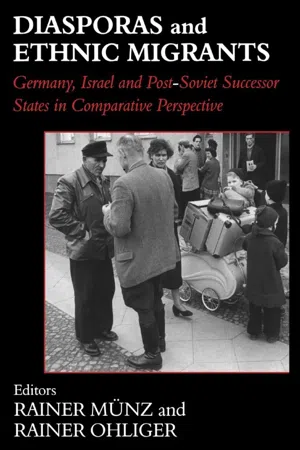Ethnic Cleansing
3 Key excerpts on "Ethnic Cleansing"
- eBook - ePub
- Karl Cordell, Stefan Wolff, Karl Cordell, Stefan Wolff, Karl Cordell, Stefan Wolff(Authors)
- 2016(Publication Date)
- Routledge(Publisher)
...10 The causes and consequences of Ethnic Cleansing Erin K. Jenne DOI: 10.4324/9781315720425-10 Introduction Ethnic Cleansing refers to “the expulsion of an ‘undesirable’ population from a given territory due to religious or ethnic discrimination, political, strategic or ideological considerations, or a combination of these” (Bell-Fialkoff 1993 : 110). On the most basic level, it is the deliberate policy of homogenizing the ethnic makeup of a territory. As this definition suggests, Ethnic Cleansing comprises not only ethnic expulsions and extermination during war, but also policies of ethnic homogenization undertaken during times of relative peace. In strategic terms, it involves the removal of targeted minorities from a given territory and the subsequent resettlement of members of the dominant group in the minorities’ abandoned homes and property. In sum, Ethnic Cleansing consists of policies of ethnic expulsion and resettlement, which may be implemented either violently or non-violently. These policies are all undertaken with the purpose of achieving ethno-territorial homogenization. The expression “Ethnic Cleansing” did not enter the modern lexicon until the 1980s, when Kosovar Serbs publicly accused the Albanian majority of ethnically cleansing the province. The term was later applied retroactively to the Serb campaign against the Muslims during the Bosnian war as well as Belgrade’s attempts to empty Kosovo of ethnic Albanians in the late 1990s. Although the concept itself is relatively new, the phenomenon to which it refers is as old as human civilization itself. The ancient Assyrians used collective deportations to manage internal unrest and rebellions as early as the thirteenth century bce; both the Assyrians and the Babylonians exiled Jewish populations in the seventh and fifth centuries bce. During and after the Crusades, Jews were massacred and expelled from Germany, England and France...
- eBook - ePub
Diasporas and Ethnic Migrants
Germany, Israel and Russia in Comparative Perspective
- Rainer Munz, Rainer Ohliger, Rainer Munz, Rainer Ohliger(Authors)
- 2004(Publication Date)
- Routledge(Publisher)
...The ethnicity of the victims is defined by a ruling or occupying power. Groups or individuals who are subjected to this definition usually have no chance to declare a different ethnicity or to influence their removal from their territory. The forced character of migration also distinguishes Ethnic Cleansing from other forms of migration. If Ethnic Cleansing is carried out over existing or newly created state borders, it can also be labelled as ‘expulsion’, whereas the removal of an ethnic group within a given country is a ‘deportation’. In most cases, expulsions are permanent. Some major causes of Ethnic Cleansing are undisputed. First and foremost, there is nationalism or, as it is frequently put, ‘radical’ and ‘ethnic’ nationalism, 2 and other ideologies such as racism. One could also agree that dictators such as Hitler and Stalin, or more recently Mil sevi, are the main perpetrators of Ethnic Cleansing. External factors such as the international community can also play an important role. The international community can legitimize or even order Ethnic Cleansing, as the Allies did after the Second World War, fight Ethnic Cleansing as in 1999 in Kosovo, or contribute to it, as in the case of the wars in former Yugoslavia in the early 1990s. 3 It has become a truism that millions of people have been and are uprooted in wars, and that wars are a major cause of forced migration. The means to devastate an area and to drive out its population have become ever more sophisticated. Not only wars, but also the conclusion of peace can generate large-scale forced migration. For example, about 12–14 million people were forced to permanently leave their homelands after the Second World War ended...
- eBook - ePub
God is Good
Exploring the Character of the Biblical God
- Martin G. Kuhrt(Author)
- 2020(Publication Date)
- Resource Publications(Publisher)
...Chapter 8 Ethnic Cleanser? “We don’t hate sin so we don’t understand what happened to the Canaanites” —Clay Jones Ethnic Cleansing refers to the systematic eradication of people of a particular background from a particular area of land. The core motivation for it today seems to be hatred of a people for what is intrinsic to their social-cultural identity. Ethnic Cleansing has been distinguished from genocide although the two often go together. The goal of Ethnic Cleansing is to rid an area of territory of a particular people who are seen as a malign influence or contaminating the “purity” of the nation. Genocide refers not just to expulsion but the intent of total annihilation. Genocide is usually motivated by a desire for Ethnic Cleansing and clearly Ethnic Cleansing is achieved by genocide. The term “Ethnic Cleansing” came to prominence during the Balkan conflicts in the 1990 s. A more recent example is the driving out of Rohingya Muslims from Myanmar. To accuse God of being an ethnic cleanser is to imply that he has the character of a racist or religious extremist, and he is guilty of “crimes against humanity.” What is the evidence Dawkins and Barker give for this claim? A straightforward reading of the Old Testament is all the evidence we need, they argue. Barker cites the commands God gave the Israelites in the books of Exodus, Deuteronomy and Joshua. He claims that the reason Saul angered God in First Samuel 15 was because he wasn’t effective enough at his job of Ethnic Cleansing. In fact, the Bible says Saul angered God because of his disobedience regarding plunder taken from the Amalekites and his fear of man rather than God in this matter...


